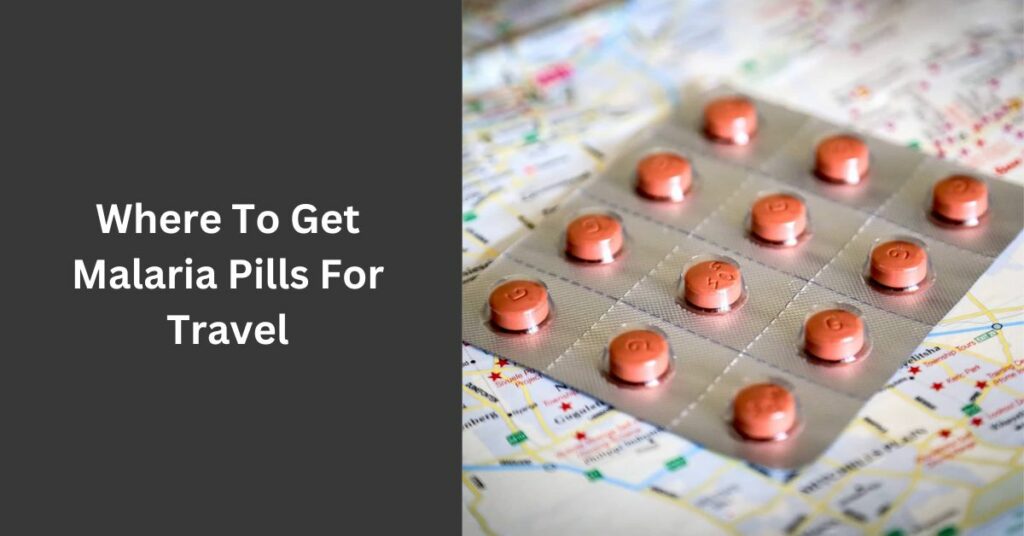I remember feeling a sense of excitement and anticipation as I planned my first trip to Africa. As I researched the best places to go and things to see, I couldn’t help but feel a twinge of apprehension about the risk of malaria.
It’s a serious disease that can be fatal if left untreated, but with the right precautions, it’s possible to protect yourself while enjoying your travels.
In this article, I’ll share my experience with finding and taking malaria pills for travel. Knowing where to get them is just the first step – it’s important to understand the risks, consult with a doctor or travel medicine clinic, prepare for side effects, and follow preventive measures.
Whether you’re traveling for work or pleasure, taking steps to protect yourself from malaria will give you peace of mind so you can focus on making memories that will last a lifetime.
Understand the Risks of Malaria
You’re in for a treat as we explore the dangers of contracting malaria while traveling through certain areas. Malaria is a disease caused by parasites transmitted to humans through the bites of infected mosquitoes. It can be fatal if not treated promptly, especially in children under five years old and pregnant women.
Malaria prevention methods include taking antimalarial medication, using insect repellents, wearing protective clothing, and sleeping under mosquito nets. However, these methods are not foolproof, and travelers should also be aware of malaria hotspots where the risk of infection is higher. These include sub-Saharan Africa, Southeast Asia, South America, and parts of Oceania.
While some people may choose to skip taking antimalarial medication due to its cost or side effects, I strongly advise against it. The consequences of contracting malaria far outweigh any temporary inconvenience or discomfort from taking pills. As someone who has experienced the debilitating symptoms of malaria firsthand while traveling abroad without prophylaxis, I cannot stress enough how crucial it is to take preventive measures seriously.
As you plan your trip and consider where to get malaria pills for travel, remember that consulting with your doctor is essential. They can assess your health status and recommend the most appropriate medication based on factors such as your destination and length of stay. Don’t take any chances with this potentially life-threatening disease – prepare yourself before you go!
Consult with Your Doctor
Make sure to check in with your doctor before embarking on any adventure, and they’ll be able to advise you on the best ways to stay healthy while exploring.
In particular, if you’re traveling to a region where malaria is prevalent, it’s important to discuss potential side effects and dosage requirements with your doctor before taking malaria pills. This will help ensure that you’re fully aware of the risks and benefits of taking these medications, as well as any precautions or special instructions that may be necessary.
During this discussion with your doctor, it’s also worth exploring natural remedies as alternatives to traditional malaria pills. While there are many effective pharmaceutical options available, some travelers may prefer more holistic approaches that don’t involve taking chemicals or synthetic medications.
Your doctor can help you evaluate these options based on their safety and effectiveness for your individual situation.
Ultimately, consulting with your doctor is the first step in ensuring that you have a safe and healthy trip when traveling in regions where malaria is a concern. By discussing potential side effects and dosage requirements with your healthcare provider, as well as exploring natural remedies as alternatives, you can make informed decisions about how best to protect yourself from this potentially serious disease.
Next up: visit a travel medicine clinic for even more specialized advice on staying healthy during your travels.
Visit a Travel Medicine Clinic
If you’re serious about staying healthy and safe during your adventure, consider visiting a travel medicine clinic for specialized advice tailored to your individual needs and itinerary. These clinics offer travelers the opportunity to consult with healthcare professionals who specialize in travel health.
They can provide you with valuable information on how to stay healthy while abroad, including recommendations for vaccinations, preventative measures against illnesses like malaria, and guidance on how to manage any medical conditions you may have. One of the most important services offered by travel medicine clinics is access to malaria medication options.
Malaria is a serious disease that can be fatal if left untreated, so it’s essential that travelers take appropriate precautions when traveling to areas where the disease is prevalent. At a travel medicine clinic, healthcare professionals can help you determine which medications are best suited for your individual needs based on factors like your destination and length of stay.
By visiting a travel medicine clinic before embarking on your adventure, you’ll be taking an important step towards ensuring that you stay healthy and safe while abroad. However, it’s important to note that while these clinics can provide valuable advice and recommendations, they don’t replace the need for consulting with your primary care physician or pharmacist prior to departure.
In the next section, we’ll discuss how checking with your pharmacy can also help ensure that you have access to the medications you need before leaving home.
Check with your Pharmacy
Before setting off on your journey, it’s wise to consult with your local pharmacy for a thorough medication check-up. Not only can they advise you on what medications you need for your trip, but they can also ensure that any prescriptions you’re currently taking won’t interfere with them.
Many pharmacies carry malaria pills and other travel-related medications, so be sure to ask about their availability. When checking with your pharmacy, it’s also important to compare costs. Malaria pills can be expensive, and prices may vary between pharmacies or even between different brands of the same medication.
By doing a bit of research beforehand, you can save money without sacrificing quality. Don’t hesitate to ask if there are any discounts or coupons available for the medication you need.
While checking with your pharmacy is a great first step in obtaining malaria pills for travel, there are other options worth considering as well. In the next section, we’ll explore alternative ways to get the medication you need before embarking on your adventure.
Consider Alternative Options
Now let’s explore other options for obtaining the medication you need before heading out on your adventure. While pharmacies are a convenient option, there are alternatives that may be worth considering. Here are four reasons why:
-
Natural Remedies: If you’re looking for a more natural approach to preventing malaria, consider trying herbal supplements or essential oils that have been shown to have anti-malarial properties. However, it’s important to note that these remedies should not replace prescription medication and should only be used as an additional measure.
-
Local Options: Depending on where you’re traveling to, it may be possible to purchase malaria medication locally once you arrive at your destination. This can save you time and money compared to getting a prescription filled in advance.
-
Online Pharmacies: There are numerous online pharmacies that offer malaria medication without requiring a physical prescription from a doctor. However, it’s important to do your research and ensure that the pharmacy is reputable and licensed.
-
Travel Clinics: Many travel clinics specialize in providing vaccinations and medications for travelers. These clinics often have experience with recommending the best malaria prevention options based on specific destinations and traveler needs.
Remember, always consult with a healthcare professional before making any decisions regarding medication or natural remedies for preventing malaria while traveling abroad.
When it comes to preparing for potential side effects of malaria medication, there are several steps you can take to minimize discomfort and stay healthy during your travels…
Prepare for Side Effects
I’ve had my fair share of experience with malaria medication and the side effects that come with it. It’s important to be aware of common side effects such as nausea, headaches, and dizziness.
To minimize discomfort, taking the medication with food or at night can help, but if side effects persist or become severe, it’s important to seek medical attention.
Common Side Effects
Experiencing tummy troubles or feeling a tad drowsy are common effects you may encounter while taking malaria pills. These side effects are manageable with some preparation and self-care. Here are three things to keep in mind:
- Stay hydrated: Drinking enough water can help alleviate nausea and prevent dehydration.
- Take the medication with food: Eating a light meal before taking your pills can reduce stomach discomfort.
- Avoid alcohol: Alcohol can interfere with the effectiveness of certain malaria medications, so it’s best to avoid it altogether.
It’s important to remember that these side effects usually go away after a few days as your body adjusts to the medication. However, if you experience any long-term effects, such as rash or vision changes, contact your healthcare provider immediately.
To minimize discomfort while taking malaria pills, there are several steps you can take. The next section will cover tips on how to make your travel experience as comfortable as possible while still protecting yourself from this potentially deadly disease.
How to Minimize Discomfort
To make your experience more comfortable, it’s essential to take steps to minimize any side effects that may arise from taking medication for malaria prevention. One way to do this is by practicing relaxation techniques such as deep breathing and meditation. These techniques can help reduce stress and anxiety, which are common triggers for headaches and nausea.
Another important factor to consider is hydration. Drinking plenty of water before, during, and after taking malaria medication can help prevent dehydration, which can exacerbate side effects. It’s also a good idea to avoid alcohol and caffeine while on the medication as they can further dehydrate the body.
By incorporating these simple steps into your daily routine, you can minimize discomfort and enjoy your travels with peace of mind. As always, it’s important to consult with a medical professional before starting any new medication or treatment plan.
When it comes to taking malaria pills for travel, it’s crucial to monitor your body for any adverse reactions. If you experience severe or persistent symptoms such as fever, vomiting or diarrhea that last longer than 48 hours after starting the medication, seek medical attention immediately. Your doctor may need to adjust your dosage or switch you to a different type of medication altogether.
Remember that prevention is key when it comes to avoiding malaria while traveling – so don’t let fear of side effects stop you from protecting yourself against this serious disease.
When to Seek Medical Attention
After taking malaria pills for travel, discomfort may still arise despite efforts to minimize it. In some cases, the symptoms can become severe and require medical attention. It’s important to recognize symptoms that go beyond normal discomfort such as fever, chills, headache, nausea, and vomiting. If these symptoms persist or become worse, seeking medical attention from a local facility is necessary.
It’s important to research local medical facilities before beginning your travels. Knowing where to seek treatment in case of an emergency will give you peace of mind and ensure prompt care. This information can usually be found on travel websites or by consulting with a doctor before leaving.
Remember that early detection and treatment are key to preventing serious complications from malaria. As you prepare for your trip, don’t forget to pack your medications along with any other necessary supplies. By being proactive in preparing for potential health issues while traveling, you’ll be able to fully enjoy your travels without worrying about getting sick.
Pack Your Medications
When I travel to areas where malaria is prevalent, one of my top priorities is packing the necessary medications. But it’s not just about having them with me – it’s also important to know how to store and transport them safely.
I make sure to keep my malaria pills in their original packaging, stored in a cool and dry place, and always within reach during my travels. And if by any chance I lose my medications, I have a plan in place for what steps to take next.
How to Store Malaria Pills
Make sure you store your antimalarial medication properly to ensure its effectiveness throughout your trip. According to a study by the World Health Organization, incorrect storage can reduce the efficacy of some antimalarials by up to 50%. Here are some tips I’ve learned from my own travels:
- Keep your medication in a cool, dry place. Heat and moisture can degrade the active ingredients, so avoid storing them in places like bathrooms or car glove compartments.
- Don’t expose your medication to sunlight. Ultraviolet radiation can also break down the active ingredients, so keep them in their original packaging or another opaque container.
- Check the expiration date. Antimalarial medications have a limited shelf life and may not be effective if they’re expired.
When it’s time to set off on your adventure, you’ll want to make sure you transport your medication safely.
How to Transport Them
Now that we know how to properly store our malaria pills, let’s talk about the best way to transport them. When traveling, it’s important to keep your medication with you at all times in case of any unexpected delays or lost luggage.
One easy transportation tip is to keep your pills in their original packaging with the prescription label intact. This not only helps with identification but can also be useful if customs officials have any questions about your medication.
Another great option is travel-friendly packaging specifically designed for medications. These containers are small enough to fit in a purse or backpack and often come with labels for easy organization of multiple types of medication. Some even have alarms or reminders built-in, so you never forget when it’s time to take your next dose.
Make sure to check with your airline or transportation provider regarding any regulations on carrying medications before departure.
If you happen to lose your medication while traveling, don’t panic! There are steps you can take to get back on track and protect yourself from malaria.
What to Do if You Lose Your Medications
If you happen to misplace your medication while on the go, it can be a stressful situation, but there are options available for replacing lost pills and ensuring you stay healthy on your journey. Here are some steps to consider if you find yourself in this situation:
- Contact a local pharmacy: They may have the medication available or can order it for you.
- Check with your travel insurance provider: Some policies cover lost medications.
- Contact your doctor or travel clinic: They may be able to provide an electronic prescription that can be filled at a local pharmacy.
- Look for emergency supplies: Some countries have malaria prevention programs that offer emergency supplies of antimalarial medication.
- Consider alternative preventive measures: In addition to taking medication, there are other ways to prevent malaria such as wearing long-sleeved clothing and using insect repellent.
It’s important not to panic if you lose your medications. There are many options available, and by taking action quickly, you can ensure that you stay healthy throughout your travels.
Now let’s discuss some preventive measures to keep in mind while traveling in areas where malaria is prevalent.
Follow Preventive Measures
Taking steps to prevent malaria before you go on your trip is essential for staying healthy and enjoying your travels. Prevention strategies include taking antimalarial pills prescribed by a doctor, wearing long-sleeved clothes and pants, using insect repellents, and sleeping under mosquito nets. It’s also important to avoid being outdoors during peak mosquito hours, which are usually from dusk until dawn.
If you do get bitten by mosquitoes, it’s crucial to seek early treatment as soon as possible. Malaria symptoms can take up to two weeks or more to appear after the initial infection. Symptoms include fever, chills, headache, muscle pain, and nausea. If left untreated, malaria can lead to severe complications such as organ failure and death.
Remember that prevention is always better than cure when it comes to malaria. By following these simple preventive measures before and during your travels, you can reduce the risk of contracting this disease significantly.
Always consult with a healthcare professional regarding any necessary vaccinations or medications needed for travel to a particular destination where malaria may be present.
Stay safe and enjoy your adventures without worrying about getting sick!
Frequently Asked Questions
What is the cost of malaria pills?
When it comes to the cost of malaria pills, it’s important to consider both brand name and generic options. Brand name pills may be more expensive, but they often come with added benefits like extended release or a more targeted approach to preventing malaria.
For budget travel, generic options can be just as effective and more affordable. To find discounted malaria pills, I recommend checking online pharmacies or reaching out to local clinics that offer travel vaccinations and medications.
By comparing prices and exploring different options, you can ensure that you’re getting the best deal without compromising on your health during your travels.
Are there any age restrictions for taking malaria pills?
Did you know that malaria is responsible for over 400,000 deaths worldwide each year? It’s a sobering statistic, but one that highlights the importance of taking preventative measures before traveling to high-risk areas.
When it comes to malaria pills, age restrictions vary depending on the type of medication prescribed. For example, doxycycline is generally not recommended for children under the age of eight, while mefloquine should be avoided by those with a history of depression or anxiety. Dosage recommendations also differ based on factors such as weight and length of stay in a malaria zone.
As someone who’s traveled extensively and taken these pills myself, I can attest to their effectiveness in preventing this potentially deadly disease. But it’s important to consult with a healthcare professional to determine which medication is right for you and any potential age restrictions or dosage recommendations that apply.
Can I take malaria pills while pregnant or breastfeeding?
As someone who’s traveled extensively and had to take malaria pills, I know firsthand how important it is to consider safety when it comes to infants and pregnancy.
While malaria pills can be effective in preventing the disease, it’s crucial to consult with a healthcare provider before taking them during pregnancy or while breastfeeding.
Some types of malaria medication have been shown to be safe for pregnant women, but others may pose risks to the developing fetus or newborn.
It’s essential to weigh the potential benefits against any possible harms and make an informed decision based on your individual circumstances.
Always prioritize your health and that of your baby – there are alternative ways to prevent malaria if you’re unable or advised not to take medication.
How long before my trip should I start taking malaria pills?
As someone who’s traveled extensively to areas with high malaria risk, I can’t stress enough the importance of pre-trip preparation to protect against this potentially deadly disease. Before your journey, conduct a thorough malaria risk assessment by consulting a healthcare professional or researching online resources. This will help determine if the area you’re visiting poses a significant threat and if taking malaria pills is recommended.
It’s crucial to start taking these pills at least one to two weeks before your trip, as they need time to build up in your system for maximum effectiveness. Don’t wait until the last minute – plan ahead and take all necessary precautions to keep yourself safe while traveling.
Are there any interactions between malaria pills and other medications I am currently taking?
As someone who’s traveled to areas with a high risk of malaria, I understand the importance of taking preventative measures, such as malaria pills. However, it’s essential to consider potential side effects and interactions with other medications.
Malaria pills can cause a range of side effects, including nausea, vomiting, and headaches. It’s also important to note that effectiveness can vary depending on the specific type of medication and the region being traveled to.
Before starting any new medication, it’s always recommended to consult with a healthcare provider to ensure safety and effectiveness.
Conclusion
In conclusion, obtaining malaria pills for travel is a crucial step in ensuring your safety and health during your trip. It’s important to understand the risks of malaria and consult with a healthcare professional before deciding on the best medication for you.
Visiting a travel medicine clinic or checking with your pharmacy are both viable options for obtaining malaria pills. However, it’s important to consider alternative options if cost or availability is an issue. While preparing for side effects may be daunting, taking preventive measures such as using mosquito nets and wearing protective clothing can greatly reduce your risk of contracting malaria.
Remember to pack your medications in their original packaging and keep them easily accessible during your travels. With proper preparation and caution, you can enjoy a worry-free trip without falling victim to this potentially deadly disease.
Stay safe, stay informed, and have a great journey!

Meet Audrey and Carl Thompson. This dynamic married couple not only shares a passion for each other but also a deep love for exploring the world. Through their captivating writing, Audrey and Carl offer a unique perspective on traveling as a couple. They delve into their personal experiences, shedding light on the challenges and joys of navigating the globe hand in hand. Their insightful articles address the questions and concerns many travelers face, helping you forge a stronger bond with your partner on your own incredible adventures.



